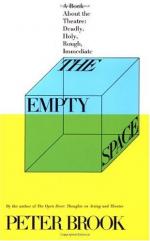
|
| Name: _________________________ | Period: ___________________ |
This quiz consists of 5 multiple choice and 5 short answer questions through The Immediate Theatre, part 2 (p 134 to 157).
Multiple Choice Questions
1. The author states, "When Brecht was alive, it was the ______ of West Berlin who flocked to his theatre in the East."
(a) Czars.
(b) Anarchists.
(c) Intellectuals.
(d) Nobles.
2. The author writes, "In Haitian voodoo, all you need to begin a ceremony is a ____ and people."
(a) Pole.
(b) Stage.
(c) Ritual.
(d) Drum.
3. Who does the author describe as perhaps the most idiosyncratic of all theatre artists?
(a) Critics.
(b) Designers.
(c) Directors.
(d) Actors.
4. Who from the Martha Graham company has evolved a ballet company whose daily exercises are a continual preparation for the shock of freedom?
(a) Merce Cunningham.
(b) Winter Stephenson.
(c) Samuel Beckett.
(d) Catherine Fitzmaurice.
5. No tribute to the latent power of the theatre is as telling as that paid to it by what?
(a) Violence.
(b) Bigotry.
(c) Censorship.
(d) Respect.
Short Answer Questions
1. The author writes of productions in Russia of classical Shakespearean works which rehearsed for how long, yet were unable to perform as well as a hack company?
2. What play was conceived by Peter Weiss, and based on many ideals of Brecht?
3. The author writes of an actor who studied the part of Hamlet for how many years and never played it because the director died before it was finished?
4. The author writes of the architecture of theatres in saying, "as for theatres, the problem of design cannot start" how?
5. On the first day of rehearsal of what show did its composer, Harold Arlen, arrive wearing a blue cornflower, with cham pagne and presents for all?
|
This section contains 268 words (approx. 1 page at 300 words per page) |

|




